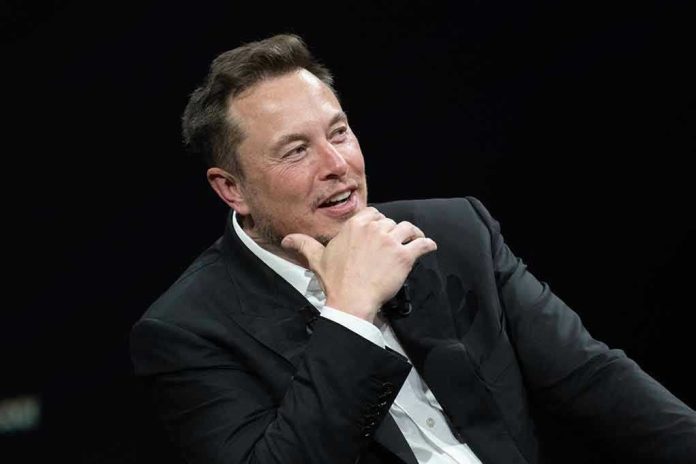
Elon Musk’s new “Macrohard” AI venture is raising serious questions about unchecked tech power and the risk of Silicon Valley giants undermining American priorities.
Story Snapshot
- Musk’s Macrohard aims to use AI to compete directly with Microsoft, intensifying the tech sector’s power struggle.
- Macrohard expands Musk’s sprawling empire, fueling concerns over accountability and divided focus across his businesses.
- The project leverages resources from across Musk’s companies, blurring corporate boundaries and raising governance red flags.
- Industry experts warn that Musk’s overextension could threaten responsible innovation and American values if left unchecked.
Musk Launches Macrohard: Another Tech Power Grab?
Elon Musk, already at the helm of Tesla, SpaceX, xAI, Neuralink, and The Boring Company, has launched yet another ambitious project—Macrohard. This new AI software company is positioned as a direct challenger to Microsoft, aiming to use generative AI to simulate and potentially disrupt established software giants. Macrohard’s creation comes at a time when American families are increasingly wary of unchecked Silicon Valley power, government overreach, and the erosion of traditional values in the name of “innovation.” The launch reignites debate over whether one individual should wield so much influence across multiple, vital sectors.
Macrohard is closely tied to Musk’s AI outfit xAI, integrating with the powerful Colossus supercomputer project and leveraging immense computational resources. Musk’s approach blurs the lines between his companies, with AI acting as the connective tissue. This cross-pollination of technology may offer efficiency, but it also concentrates power in a way that raises serious concerns for anyone who values transparency, competition, and American economic independence. By merging xAI with X (formerly Twitter) and hinting at potential investments from Tesla and SpaceX, Musk is creating a network where resources and influence are centralized—an arrangement that would make any constitutionalist pause.
Operational Risks and the Dangers of Overextension
Industry analysts and conservative commentators alike are sounding the alarm about the risks of Musk’s divided attention. Macrohard is just the latest in a series of high-stakes ventures, each requiring massive capital and executive oversight. While Musk touts speed and integration as competitive advantages, the reality is that such overextension could threaten responsible management and long-term American interests. Investors and employees are already facing uncertainty as priorities shift and pressure mounts to deliver results across multiple, interconnected companies. This model invites governance challenges and reduces accountability—a scenario that has historically led to costly mistakes, both for shareholders and the broader public.
Macrohard’s strategy is to use generative AI agents to simulate entire software ecosystems, taking aim at Microsoft while also challenging the status quo in the tech sector. While innovation is important, the lack of clear boundaries and the rapid pace of change could undermine established safeguards that protect both consumers and American workers. The consolidation of AI, software, and hardware under a single visionary may accelerate progress, but conservatives know that unchecked concentration of power—whether in government or in Silicon Valley—is a recipe for unintended consequences and potential overreach. If left unchallenged, Macrohard’s model could set a precedent for future tech titans to bypass traditional checks and balances.
Implications for American Values and Industry Stability
The launch of Macrohard raises critical questions about the future of American industry, competition, and constitutional values. While some hail Musk’s boldness as a driver of progress, others argue that this level of concentration threatens the very fabric of a free-market economy. The risk is not just operational—there are real concerns about how such power could be leveraged to influence policy, culture, and even the political process. With AI now at the heart of so many industries, the stakes are higher than ever. Conservatives should ask: Who holds these tech giants accountable, and how do we ensure that American principles of individual liberty and limited government are protected in the age of AI?
Elon Musk is starting yet another AI side project, 'Macrohard,' to challenge Microsoft: Musk’s announcement adds to his list of business ventures that stands to divide his attention even further over his already operational companies https://t.co/RUWnu95Bnh pic.twitter.com/yywhfGlB4N
— Quartz (@qz) August 25, 2025
Expert opinions are divided. Some analysts see Macrohard as a necessary challenge to entrenched tech giants like Microsoft, but warn that Musk’s history of spreading himself thin could undermine the effectiveness of all his ventures. Academic voices highlight the potential for AI to disrupt traditional business models, yet caution that leadership bandwidth and clear governance are more critical than ever. Conservatives recognize that America’s strength comes from healthy competition, strong institutions, and leaders who respect the balance of power. As Macrohard ramps up, it is essential to keep a watchful eye on Silicon Valley’s expanding footprint and demand transparency, accountability, and respect for American values.
Sources:
Elon Musk targets Bill Gates, Microsoft with new AI venture ‘Macrohard’
Elon Musk’s ‘North Star’: AI, Tesla, xAI, and SpaceX investments in 2025
Elon Musk: Biography, Companies, and Investments
Elon Musk wants to recreate Microsoft with Macrohard using AI






